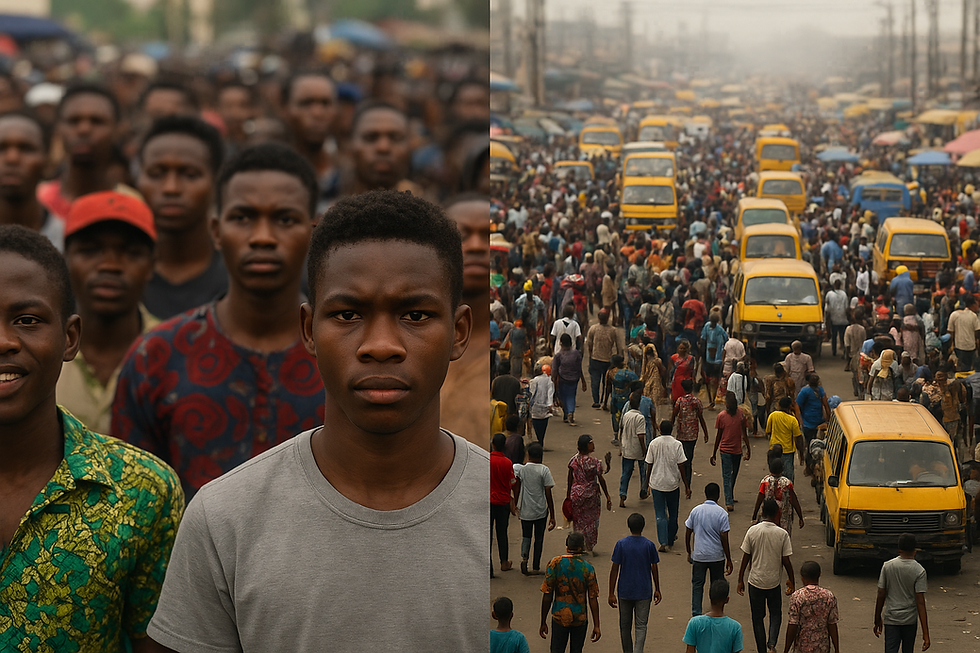Demographic Dividend or Time Bomb? Analyzing Nigeria's Youth Bulge Through an Economic Lens
- momohonimisi26
- Aug 26, 2025
- 3 min read
Updated: Aug 29, 2025

Nigeria stands at a demographic crossroads. With a median age of just 18.1 years and over 60% of its 220 million people under the age of 25, the nation possesses one of the largest and most vibrant youth populations in Africa. Through an economic lens, this presents two starkly different futures: a transformative demographic dividend or a destabilizing demographic time bomb. The path the nation takes depends almost entirely on its ability to translate this human potential into productive economic power. The arithmetic is both inspiring and daunting.
Nigeria’s population is projected to exceed 400 million by 2050, meaning millions of young people will enter the job market every year for the foreseeable future. To simply keep pace with this growth, the economy must generate a staggering number of new jobs annually. Historical economic growth rates, often cited in positive terms, have proven to be largely "jobless growth," driven by oil revenues that do not create widespread employment.
The unemployment and underemployment rates among youth are already critically high, signaling that the current economic model is insufficient. For this bulge of young people to become a dividend, specific industries must not just grow, but thrive and succeed at an unprecedented scale.
1. Agriculture and Agribusiness: This is non-negotiable. Agriculture remains the largest employer in Nigeria, but is plagued by low productivity and subsistence farming. A concerted shift towards a commercialized agribusiness sector, encompassing modern farming techniques, food processing, storage logistics, and export, could absorb millions. It offers opportunities for young entrepreneurs in tech-driven agriculture (AgriTech), moving the sector up the value chain and ensuring food security.
2. Digital and Creative Economy: Nigeria’s tech and creative scene, particularly its famed "Afrobeat" music and "Nollywood" film industries, has already demonstrated global potential. The digital economy, spanning software development, fintech, e-commerce, and digital marketing, is a critical absorber of educated youth. These sectors are agile, require less massive infrastructure than manufacturing, and can create high-value jobs. Supporting this ecosystem with reliable electricity, internet access, and favorable policies is an economic imperative.
3. Manufacturing and Light Industry: No economy has modernized without a strong manufacturing base. Nigeria must move beyond importing finished goods to producing them. Focusing on light manufacturing, food processing, textiles, furniture, and consumer goods can create numerous semi-skilled and skilled jobs. Success here hinges on overcoming infamous structural bottlenecks: erratic power supply, inadequate infrastructure, and complex regulatory environments that stifle enterprise.
4. Renewable Energy and Infrastructure: The nation's power deficit is its biggest economic shackle. Addressing it creates a double win. A massive push in renewable energy (solar, wind, hydro) and general infrastructure development (roads, rail, housing) would employ vast numbers of engineers, technicians, and laborers in the short term, while providing the reliable power needed for all other industries to flourish in the long term.
The Consequences of Failure
The alternative to proactive investment in these sectors is bleak. If millions of young, ambitious, and increasingly educated people consistently find closed doors and hopelessness, the demographic dividend swiftly becomes a time bomb. Economically, mass unemployment leads to a catastrophic waste of human capital, lower overall productivity, and increased pressure on social services. It stifles domestic demand and consumer spending, creating a stagnant economy.
Politically, it breeds disillusionment with governance, fueling social unrest and increasing the allure of criminality and radicalization.
The security challenges posed by groups like Boko Haram and widespread banditry are inextricably linked to a vast pool of disenfranchised youth with limited economic alternatives. The choice is Nigeria’s to make. The youth are not a problem to be solved; they are the nation's greatest untapped resource. Harnessing their potential requires more than rhetoric. It demands a ruthless focus on economic diversification, investor-friendly reforms, and massive investment in education and health to ensure the coming generations are not just numerous, but also skilled, healthy, and ready to work. The time to act is now.



Comments